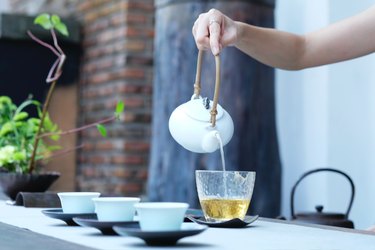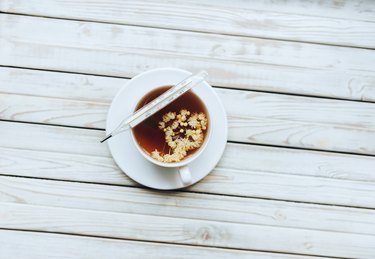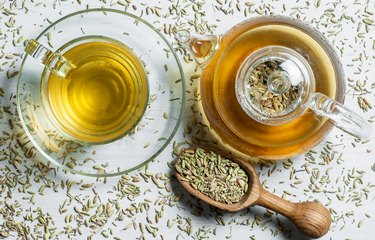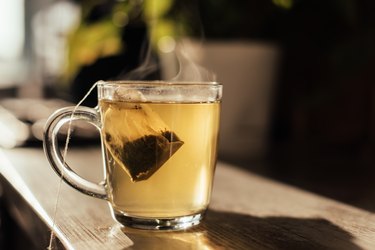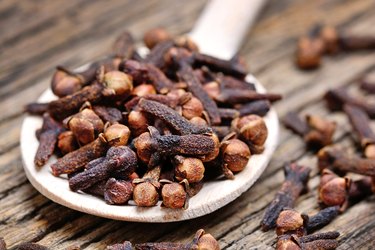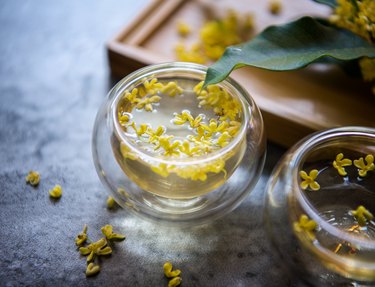
There's always something brewing in the world of herbal teas. If osmanthus flower tea hasn't made it onto your tea-time menu yet, your tastebuds are in for a treat, but the purported health benefits are not as strong.
What Is Osmanthus Flower Tea?
Video of the Day
Osmanthus tea is popular in East Asian countries, according to North Carolina State Cooperative Extension (NC State Extension).
Video of the Day
The tea is made from the small white flowers of the diminutive Osmanthus fragrans tree, also known as the tea olive, or sweet osmanthus, which grows to a maximum of 20 feet. The flowers of this tree are so fragrant they are also used as an ingredient in expensive perfumes.
You can purchase dried osmanthus flowers for steeping in hot water, or ready-made teas that often combine traditional black, green or oolong tea leaves with osmanthus flowers.
It's worth highlighting that chrysanthemum is another popular East Asian beverage made from flowers, which shouldn't be confused with osmanthus. Chrysanthemum tea has been shown to have some antioxidant compounds, according to a January 2019 study in Molecules. But it's made from the flowers of Chrysanthemum x morifolium — a completely different plant, according to NC State Extension.
Potential Benefits of Osmanthus Tea
"Osmanthus tea contains trace amounts of the nutrients cobalt, manganese, molybdenum and selenium," says New York-based registered dietitian Bonnie Taub-Dix, RDN. "In addition, it is caffeine-free, though this won't be the case when osmanthus flowers are added to normal tea."
She says osmanthus tea — like many teas — contains polyphenols, which are a type of antioxidant that can protect the heart, along with other health benefits.
In a very small February 2013 trial of 20 people in the Taiwanese Journal of Agricultural Chemistry and Food Science, authors concluded drinking one cup a day of osmanthus flower tea for seven days may increase the antioxidants in healthy adults but more research is needed to determine if this leads to any measurable changes in health outcomes.
Unproven Claims About Osmanthus Tea
Several of the claims made about osmanthus flower tea are overstated or simply unproven.
For example, claims have been made that the tea benefits dry skin, but there's no evidence to support this. "If osmanthus tea helps dry skin, it's probably because drinking fluids in general helps promote healthy hydration," Taub-Dix says.
Claims that a mug of osmanthus tea can help weight loss and detoxification are also far-fetched. "No herbal tea can help you ditch pounds or detoxify your body; to control your weight, you're always going to have to modify your diet and exercise habits," Taub-Dix says. "And thankfully, you also have a liver and lungs and kidneys to help with detoxification and don't usually need extra help with this."
That said, when it comes to appetite control, Taub-Dix says a steamy mug of tea could help quench the desire to eat if you may actually just be thirsty. But any type of tea would have this effect.
As for risks or side effects: If you plan to begin drinking osmanthus flower tea regularly, use caution. "As with any herbal product, it's best to begin drinking the tea slowly without overdoing the quantities, just in case you have a negative reaction," Taub-Dix says.
- NC State Extension: “Osmanthus fragrans”
- Molecules: “Phytochemical Composition and Antioxidant Activities of Two Different Color Chrysanthemum Flower Teas”
- NC State Extension: “Chrysanthemum x morifolium”
- Bonnie Taub-Dix, MA, RDN, CDN, registered dietitian, Long Island, New York; author, Read It Before You Eat It — Taking You from Label to Table
- Taiwanese Journal of Agricultural Chemistry and Food Science: “Effect of an Osmanthus Fragrans Flower Beverage on the Antioxidant Activity in Healthy Individuals”
